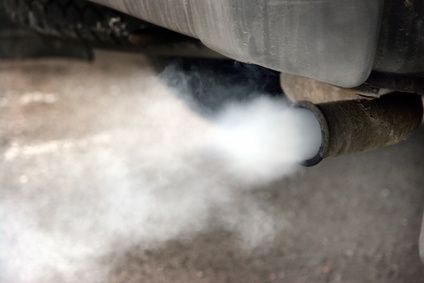
Engines are so complicated that if they hadn't been in production for over a century, it's likely that no one would believe they'd really work. Proper engine performance is dependent on a very precise balance of air/fuel mixture, spark timing and exhaust management; any deviation from any of these parameters will cause malfunction, which is often expressed as "surge" (rapid acceleration/deceleration cycles).
Almost all surging conditions encountered by fuel-injected engines have to do with "parameter hunting." When any one of an engine's carefully controlled parameters (especially fuel flow) exceeds what the ECM (electronic control module, a.k.a. "the computer") expects, it will automatically adjust air intake, fuel injection timing and spark plug timing to get everything back in line. Parameter hunting is a trial-and-error process, and every time the engine drops power the computer will almost invariably overcompensate with too much/too little fuel or timing advance. This dropping/overcompensating cycle is at the heart of all surging problems.
A badly clogged fuel filter will reduce fuel pressure enough that the ECM must open the fuel injectors more to maintain the same amount of flow. Once the ECM has effectively "pegged" the fuel filters into the open position, fuel pressure rapidly rises, which shoots more fuel into the engine than it needs. The ECM compensates by shutting the injectors, resulting in another fuel pressure drop and renewal of the surging cycle. Fuel injectors contain very fine mesh filters, which can just as easily clog and cause the same sort of surging.
After spending some time in storage, gasoline will begin to react with the oxygen around it and lose its potency. This oxidization process is essentially combustion in very slow motion: fuel combines with oxygen to produce carbon dioxide, water and contaminants like nitric oxides and loose carbon molecules. Once the engine begins ingesting this "pre-burnt" gasoline, its ECM reads the exhaust temperature as a "lean burn" (too much air) condition. In attempting to adjust, the computer injects more bad fuel, which essentially douses the flame in the engine's combustion chambers. Once the ECM detects a lack of flame, it backs off fuel injection, runs lean and must repeat the surge/stall cycle over and over again just to keep running.
Vacuum leaks can cause surging on some engines, but it depends on the type of fuel injection system. The MAF (mass air flow) systems used on many cars measure the amount of air flowing through the engine's throttle valve (throttle body) and use that information to determine how much fuel to inject. Vacuum leaks in MAF systems will usually cause a rough idle, but often will not result in surging under cruise.
Other cars use MAP (manifold air pressure) systems that extrapolate air flow from the intake manifold's internal air pressure. MAP systems are more prone to surge while cruising than MAF systems, although both will surge during acceleration if a vacuum leak is present.